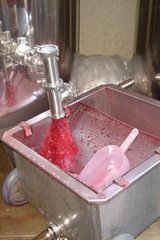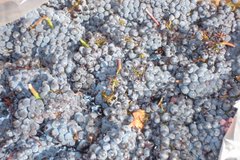The first blog for the Illinois Winemakers' Alliance comes from a blog at Tom Wark's 'Fermentation' blog. Tom Wark, the Executive Director of the Specialty Retailers' Association, explains what is going on in the Illinois Wine Industry in a blunt, yet totally understandable, way:
1933: Hitler and Wholesalers
For anyone who has not been following the attempt in Illinois to re-write the wine distribution laws in that state so that distributors are granted even more power than the state already grants them, a new development has occurred.
A new association of wineries calling themselves The Illinois Winemakers Alliance has formed in part to oppose Illinois House Bill 429.
HB 429 does a variety of things:
Allows out-of-state wineries to ship to Illinoisans2. Allows in-state wineries to ship to Illinoisans3. Allows wineries making up to 25,000 gallons of wine to distribute 5,000 gallons annually to retailers and restaurants4. Prohibits wineries making over 25,000 gallons of wine to distribute directly to retailers and restaurants5. Prohibits Illinoisans from purchasing wine from out-of-state retailers..6. Allows Illinoisans to have wine shipped to them from in-state retailers
The reasons consumers are against this bill should be obvious. They are being stripped of a long held right to buy from out of state wineries. But when you couple this with the fact that in-state retailers may still ship to Illinoisans you can see the unconstitutional implications of the proposed legislation. To quote from the Granholm v. Heald Supreme Court decision:
"States may not enact laws that burden out-of-state producers or shippers simply to give a competitive advantage to in-state businesses….If a State chooses to allow direct shipment of wine, it must do so on evenhanded terms…”
However, the new Illinois Winemakers Alliance, while opposing this anti-consumer provision of HB 429, is also opposing the bill because it strips some Illinois wineries from selling directly to retailers and restaurants, even in the small amount that the bill allows smaller wineries to sell. These wineries that make more than 25,000 gallons annually and that would no longer be able to sell direct to retailers and restaurants, would be put at the mercy of Illinois wholesalers—who are the only ones who could sell these wines to the trade but are under no obligation to distribute these wines. Put simply, Illinois wineries making over 25,000 gallons of wine would be at the mercy of Illinois wholesalers to get their wines in restaurants and on store shelves. What if no wholesalers want to distribute these wineries' wines?
You can see why the new Illinois Winemakers Alliance, that represents wineries producing nearly half the wine made in the state, are against HB 429. And you can see why wholesalers just LOVE this legislation.
Currently HB 429 is sitting in the Senate Rules Committee awaiting action. It has passed the house and would likely pass the Senate if it ever gets out of the Rules Committee.
HB 429 represents the kind of regressive direct shipping and wine legislation that has popped up all over the country since the Granholm Supreme Court decision. What's most interesting is that NO consumers are asking that this kind of legislation be passed. And no wineries are asking that their ability to sell directly to retailers and restaurateurs be diminished. As always it's the wholesales that are demanding this legislation.
With regard to the anti-consumer legislation proposing that wine lovers no longer be allowed to buy wine from out of state retailers, it seems counter-intuitive that wholesalers should have anything at all to say about this. Wholesales don't interact with consumers. They don't sell to consumers and they don't buy to consumers. They don't talk to consumers and they certainly don't listen to consumers. Why are they always the one's proposing legislation that affects consumers?
When was the last time you saw wholesalers actually do something beneficial for consumers?
They talk a big game about providing lots of choice by distributing so many wines in so many states. Yet, there's no way they can rival the number of wines that are made available to consumers via direct means. Furthermore, they spend millions of dollars opposing consumer access to wines through campaign contributions, writing anti-consumer legislation and opposing reasonable direct shipping legislation.
There is one theme that runs through all the actions of wholesalers whether they are opposing direct shipping to consumer or the ability of wineries to sell direct to restaurants and retailers: Their actions are all meant to reduce the power of their competition.
It's as though they know something very fundamental about themselves and their business model and the market place. It's as though they know that forced to compete in a level market they'd lose that competition. Luckily, they've had the states on their side since 1933 when prohibition ended and most states mandated that producers of wine sell to wholesalers who would then sell to retailers and restaurants. In essence, the states have been protecting wholesalers from themselves for nearly three quarters of a century.
By coincidence........the wholesalers gained their power the same year Hitler gained power and became Chancellor in Germany.
It's not 1933 anymore.
Tom Wark is the executive director of the Specialty Wine Retailers Association.
Subscribe to:
Post Comments (Atom)






No comments:
Post a Comment